

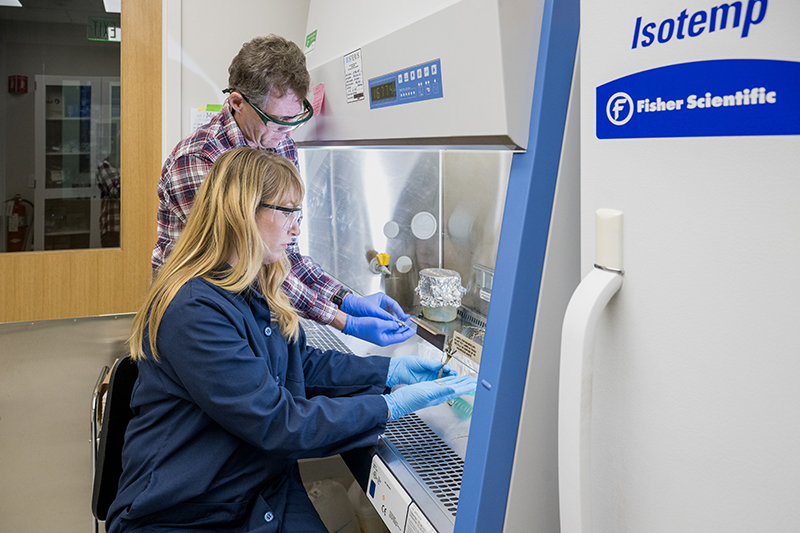
Lab collab
Photos by Kathy F. Atkinson and courtesy of Brian Kunkel January 15, 2025
Jill Pollok, Brian Kunkel and UD undergraduate students team up to stay ahead of invasive species throughout Delaware
Invasive species impact environments by preying on native species, causing or carrying disease and killing plant life and crops in an area. Globally, the economic cost of invasive species has been estimated at $1.288 trillion over the past 50 years.
Entomologist Brian Kunkel and plant diagnostician Jill Pollok share a collaborative relationship that bridges insect and plant pathology in tackling the region’s agricultural and ornamental challenges through University of Delaware Cooperative Extension. From diagnosing diseases in crops to identifying invasive species threatening local landscapes, they are the go-to Delaware experts in their respective fields, giving undergraduate students hands-on work experience along the way.
Pollok’s Lab, the UD Plant Diagnostic Clinic, receives plant samples from homeowners, farmers and nurseries across Delaware and surrounding states. The team examines them for issues such as viruses, fungi and insect damage. Students in the Pollok Lab learn to use various molecular laboratory techniques to diagnose issues in plants so that homeowners and businesses can keep their plants healthy.
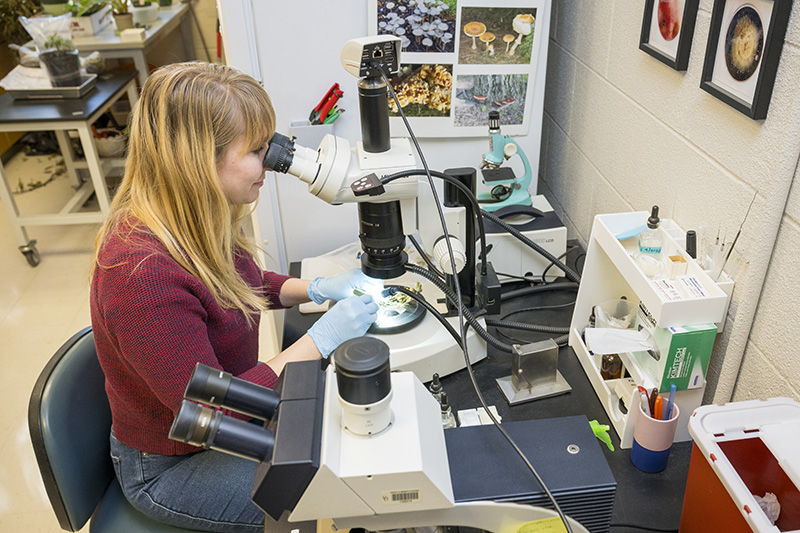
“We get shipped coolers full of plant samples,” said Natalia Sierra, a senior pre-veterinary medicine major. “They could be from Maryland, Pennsylvania, Delaware and sometimes even Southern New Jersey. In the summer, we were getting at least three to four samples a day.”
Although Sierra is a student in the Department of Animal and Food Sciences, she said she will take a lot from her time working in a Department of Plant and Soil Sciences lab.
“I got so much experience working in a laboratory setting, just doing things like PCR [polymerase chain reaction] or working with plant DNA, is something that I can use in the animal field because it's the same techniques,” she said. “A lot of the lab skills I’ve gained are really valuable, and I’m definitely going to be using them in the future, just for slightly different samples.”
In addition to looking for plant damage from viruses or fungi, when the interns in the Pollok Lab identify an insect or insect damage on the plant, they call in Kunkel, a Cooperative Extension specialist for ornamentals integrated pest management (IPM), and his student interns.
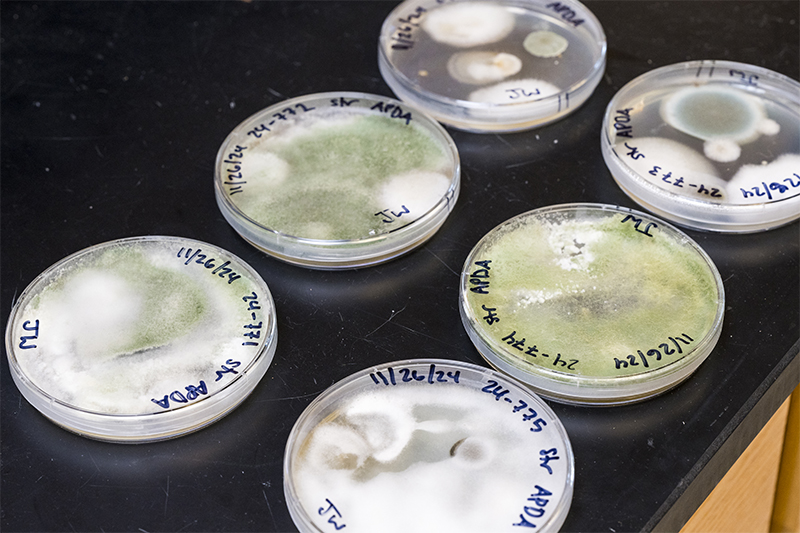
Kunkel investigates insect invasion on ornamental plants across Delaware and its surrounding states — from New Jersey into Pennsylvania, as far south as the Eastern Shore of Virginia and as far west as Frederick, Maryland.
“Typically, we go out to identify the insects at a specific location, looking at the seasonality in the insect phenology so that industry professionals can better target management of it using insecticides that are less harmful for the environment,” Kunkel said.
Conveniently, the Kunkel and Pollok labs are right next door to each other in UD’s Townsend and Worrilow Halls. Samples can be easily transported back and forth, which came in handy last summer when Sierra identified the box tree moth caterpillar in a sample from a 300-year-old boxwood sent in by a homeowner.
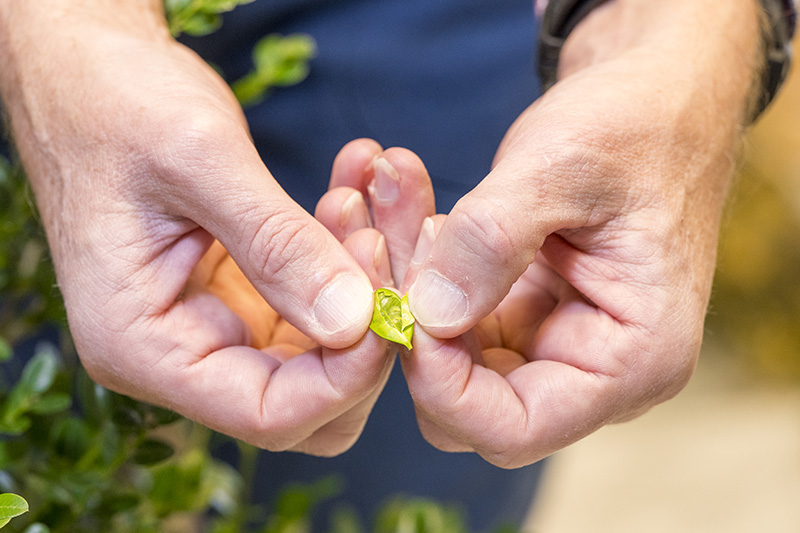
“I was going through all of our encyclopedias since a Google search yielded no information on the plant pathology,” Sierra said. “Then I said, ‘Oh, it’s a box tree moth,’ in the office, and Jill immediately looked up and said ‘We have to call Brian.’”
A cascade of events followed, with Kunkel, Pollok and all of their respective interns gathering around trying to confirm the species.
The box tree moth, which had not been found in Delaware until this past summer, is an invasive pest that causes damage to boxwood trees by defoliating the host plants and feeding on the bark, eventually killing the host plant. After Kunkel confirmed that it was a box tree moth, the Delaware Department of Agriculture was at UD within the hour to confirm the species.
One of Kunkel’s interns and Cooperative Extension Scholar, Thor Freeman, was mainly focusing on ornamental pests such as flea beetles and crape myrtle bark scale. However, he was able to get a piece of the box tree moth action.
“Three of the box tree moth caterpillars ended up hatching while they were in our lab, so we were able to freeze and pin them,” Freeman, an insect ecology and conservation major, said. “Then we wrote a bunch of [Cooperative Extension] fact sheets about them to educate the general public about the box tree month.”
Freeman hypothesized that the box tree moth they found probably came from someone in New York selling box trees, or boxwoods, that then shipped them down here to another nursery where they were then transferred over to the homeowner’s property with the original tree.
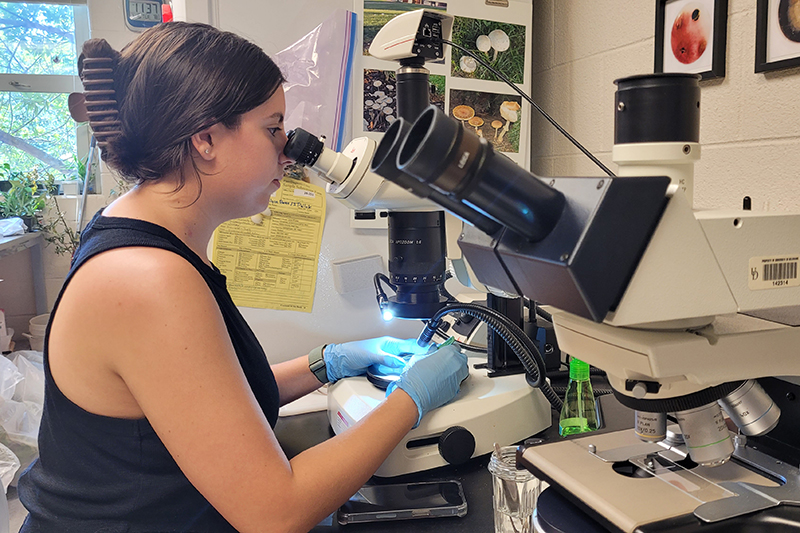
The joint effort between the two labs extends further from the box tree moth. The Pollok and Kunkel labs regularly collaborate and work together to solve environmental problems.
“We work with [Kunkel’s lab] all the time,” Sierra said. “ If we get an insect, we usually try to identify it, but typically we’ll send it to him and his interns to diagnose it.”
“It is nice when we get to work with Jill's lab because I don't know anything about plant disease, and I always learn something from them,” said Grace Ferry, double major in wildlife ecology and conservation and insect ecology and conservation and an intern in the Kunkel lab.
Kunkel has taken interns from both labs to the Delaware Department of Agriculture’s field inspections and behind-the-scenes tours of the renowned Mt. Cuba Center and Longwood Gardens with their IPM coordinators.
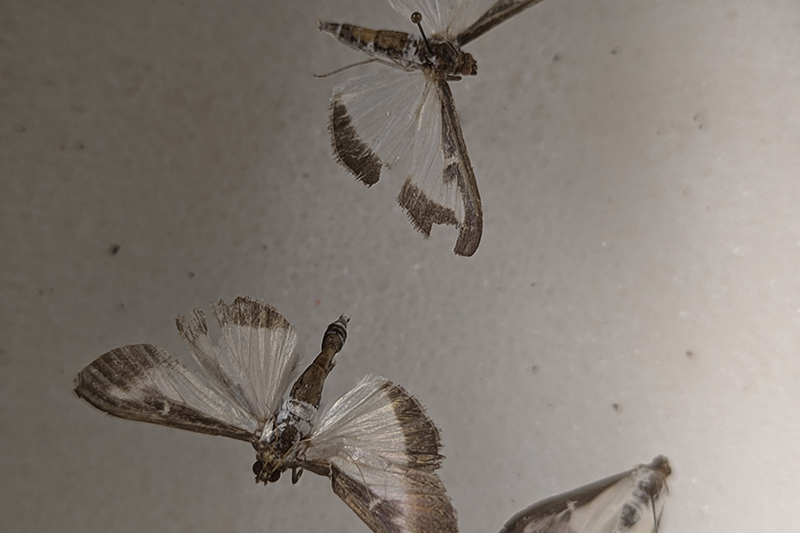
“They saw and heard about disease issues that occur and how they manage them with the general public that’s constantly around,” Kunkel said. “Both Jill’s interns and my interns saw greenhouses and facilities separate from the general public.”
“During this Mt. Cuba seminar, we helped professionals in a workshop setting learn about pests and disease,” Ferry said. “My favorite aspect of the research we do is we get to learn and explore new things every day. There are so many insects out there, and we get to go out into the field everyday to experience them.”
Currently, the interns in both labs are contributing to an information book on plant diseases, insect issues and landscape management. When the information is finalized, homeowners can learn for themselves how to diagnose these issues happening in their gardens.
The collaboration between the two labs is crucial to UD’s efforts in managing plant and insect-related issues, helping homeowners, farmers and nurseries in effective pest and disease management, while also providing student interns with invaluable research experiences.
“In the College of Agriculture and Natural Resources, we learn One Health, the idea that everything relates to one another, and I’ve really seen that here,” Sierra said. “For example, when things are wrong with the crops, that affects how we eat, how the animals will eat. So our work really does pertain to everything.”
Contact Us
Have a UDaily story idea?
Contact us at ocm@udel.edu
Members of the press
Contact us at mediarelations@udel.edu or visit the Media Relations website

